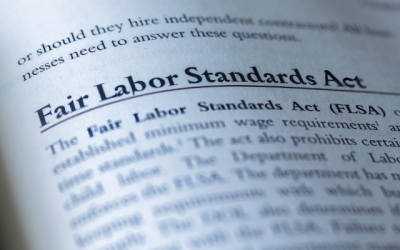The Fair Labor Standards Act (FLSA) is a significant federal labor law in the United States that establishes essential labor standards and protections for workers. Enacted in 1938, the FLSA has had a profound impact on ensuring fair wages, overtime pay, child labor regulations, and recordkeeping requirements. In this article, we will delve into the history of the FLSA, explore its four main components, and highlight why compliance with this legislation is crucial for businesses. Applied Business Solutions is dedicated to helping businesses navigate FLSA regulations, providing expert guidance and support. Contact us today for all your FLSA needs.
The History and Purpose of FLSA
The FLSA was passed in response to widespread labor abuses during the Great Depression. Its primary purpose was to establish fair labor standards, protect workers from exploitation, and stimulate economic recovery. The legislation aimed to address issues such as excessively long work hours, low wages, and unsafe working conditions prevalent at the time. Since its enactment, the FLSA has been amended several times to adapt to changing labor practices and societal needs.
The Four Components of FLSA
- Minimum Wage: The FLSA sets a federal minimum wage that employers must pay to covered employees. As of my knowledge cutoff in September 2021, the federal minimum wage is $7.25 per hour. However, individual states or localities may have higher minimum wage rates. The minimum wage provision ensures that workers receive reasonable compensation for their labor, helping to support their basic needs and promote economic stability.
- Overtime Pay: The FLSA mandates that covered employees be paid overtime wages at a rate of 1.5 times their regular hourly pay for any hours worked beyond 40 in a workweek. This provision aims to prevent the exploitation of workers by compensating them adequately for their extra time and promoting work-life balance. Certain employees may be exempt from overtime pay, such as those classified as salaried professionals or meeting specific criteria for executive, administrative, or professional roles.
- Child Labor Regulations: The FLSA includes strict regulations on child labor to protect the well-being and educational development of minors. It establishes minimum age requirements for various types of work, specifies permissible work hours for minors of different age groups, and identifies hazardous occupations prohibited for young workers. These provisions ensure that children are not subjected to labor that could be harmful to their health, education, or overall well-being.
- Recordkeeping Requirements: Employers covered by the FLSA must maintain accurate records of employees’ wages, hours worked, and other relevant information. This includes payroll records, timecards, and documentation that supports compliance with FLSA requirements. By maintaining proper records, employers can demonstrate their adherence to labor standards and resolve any disputes or audits effectively.
Importance of FLSA Compliance for Businesses
Compliance with the FLSA is of paramount importance for businesses due to several reasons. Firstly, adherence to the FLSA helps protect workers’ rights and promotes a fair and equitable work environment. By complying with minimum wage and overtime provisions, businesses demonstrate their commitment to compensating employees fairly for their work.
Moreover, compliance with child labor regulations ensures that businesses do not engage in exploitative practices or jeopardize the well-being of young workers. Following recordkeeping requirements helps maintain transparency, simplifies payroll processes, and enables employers to respond to any legal inquiries or audits effectively.
Non-compliance with the FLSA can have severe consequences for businesses, including costly legal disputes, financial penalties, and damage to their reputation. Violations can result in back pay owed to employees, liquidated damages, and even criminal charges in extreme cases.
The Fair Labor Standards Act (FLSA) plays a crucial role in protecting workers’ rights, establishing fair labor standards, and ensuring economic stability. Compliance with the FLSA is essential for businesses to maintain ethical practices, avoid legal complications, and foster a positive work environment. Applied Business Solutions specializes in guiding businesses through FLSA compliance, offering expert advice and support. Contact us today to ensure your business meets FLSA requirements and provides fair and lawful employment practices.





